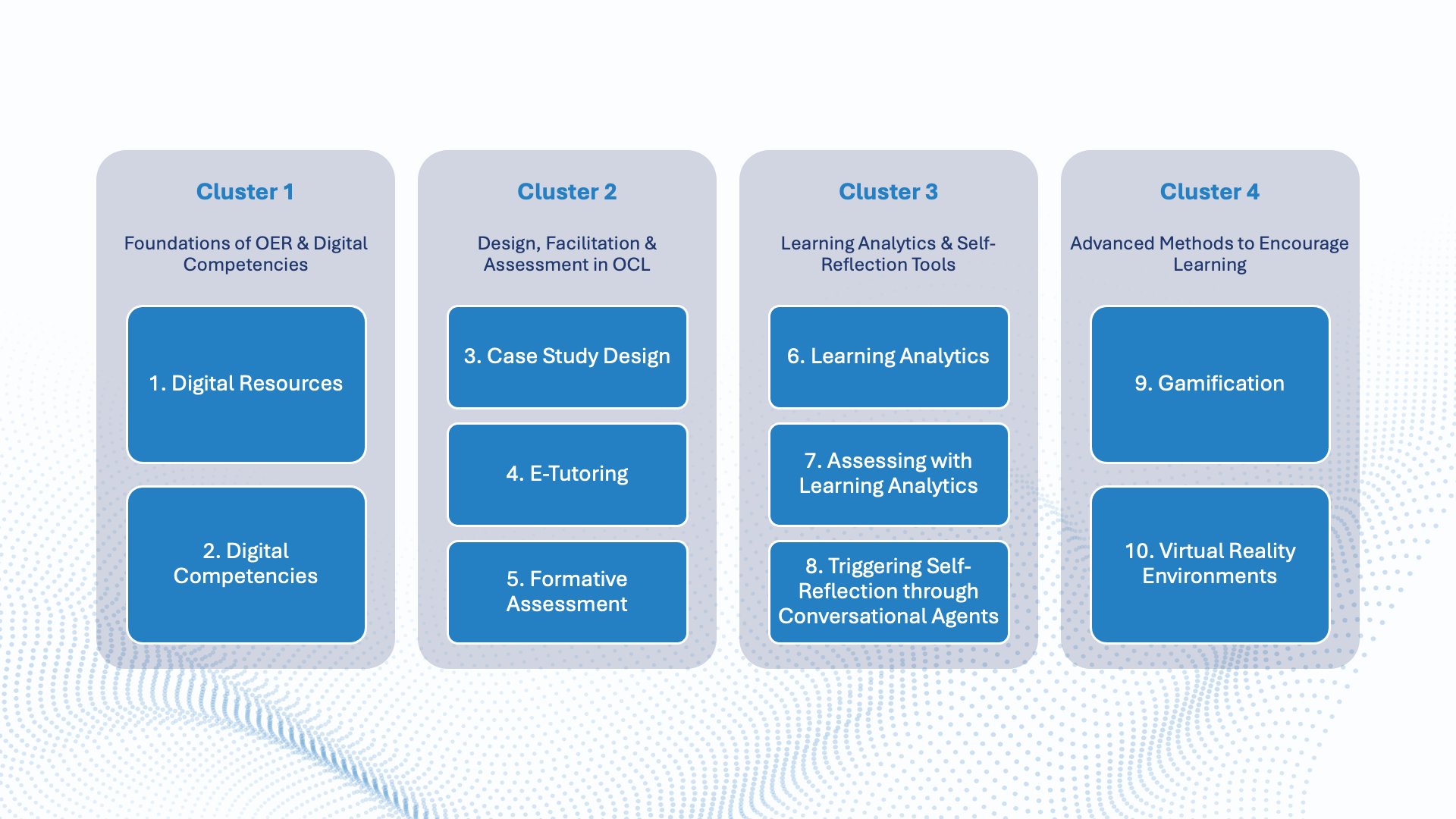Courses
Project Results 2-5: OER-CODEX Online Training Programme
The OER-CODEX project translates its pedagogical vision into practice through a structured series of four course clusters—Project Results 2 to 5—each designed to strengthen the digital and collaborative teaching capacities of higher education educators.
Together, these project results form a comprehensive learning journey that equips instructors with the knowledge, tools, and confidence to design, implement, and assess online collaborative learning (OCL) environments using Open Educational Resources (OER).
Each cluster includes self-paced online courses (2 ECTS per course) that are grounded in real teaching practice and co-developed by international university partners. They emphasize learner engagement, knowledge co-creation, and digital openness, while aligning with the DigCompEdu Framework and the quality principles established in Project Result 1.
Overview of OER-CODEX Online Training Programme

Cluster 1 | Courses 1 & 2 | Led by Vytautas Magnus University (VDU), Lithuania
This cluster lays the essential groundwork for teaching in digitally enriched, collaborative learning environments. It equips educators with both the conceptual and practical skills needed to engage with Open Educational Resources (OER) and digital pedagogy, aligned with the DigCompEdu Framework.
💡 Courses in this Cluster:
Course 1: Digital Resources
Focuses on identifying, adapting, and creating high-quality OER. Educators learn how to find trustworthy repositories, apply Creative Commons licenses, and contribute to the open education movement.
Course 2: Digital Competencies
Explores the role of digital tools in fostering 21st-century skills. Educators gain foundational knowledge in digital pedagogy and collaborative online teaching strategies.
🔹 Learning Outcomes:
- Understand key principles of open education and OER licensing.
- Navigate and evaluate digital repositories for teaching materials.
- Apply digital tools for learner-centred and collaborative instruction.
Advance from A1 (Newcomer) to B1 (Integrator) on the DigCompEdu scale.
Cluster 2 | Courses 3–5 | Led by Technische Universität Dresden (TUD), Germany
This cluster supports educators in the full lifecycle of online collaborative learning: designing meaningful learning scenarios, facilitating group engagement, and assessing learner progress through formative methods and feedback strategies.
💡 Courses in this Cluster:
Course 3: Case Study Design
Guides educators in creating structured, case-based learning environments that promote critical thinking and knowledge co-construction.
Course 4: E-Tutoring & Facilitation
Introduces the evolving role of e-tutors and moderator tandems in online learning environments. Emphasises support structures and peer-learning facilitation.
Course 5: Formative Assessment
Provides practical frameworks for feedback-rich assessment. Focuses on digital platforms, peer review, and learning analytics within collaborative settings.
🔹 Learning Outcomes:
- Design structured and engaging collaborative learning tasks.
- Facilitate inclusive and motivating online learning environments.
- Apply effective formative assessment tools tailored to online collaboration.
- Develop qualification frameworks for digital tutors.
Cluster 3 | Courses 6–8 | Led by Technische Universität Dresden (TUD), Germany
This cluster addresses the intersection of data-informed teaching and learner autonomy. Educators learn how to apply Learning Analytics (LA) and Conversational Agents (CAs) to improve feedback, assessment, and metacognitive reflection.
💡 Courses in this Cluster:
Course 6: Learning Analytics
Covers key phases of LA, ethical considerations, and how to use learning data to support teaching strategies and student learning pathways.
Course 7: Assessing with Learning Analytics
Teaches how to implement data-informed formative assessments, monitor group collaboration, and adjust instruction based on analytics.
Course 8: Triggering (Self-)Reflection through Conversational Agents
Explores how Conversational Agents (CAs) and Learning Companions (LCs) can promote learner self-reflection, autonomy, and deep learning.
🔹 Learning Outcomes:
- Understand and apply ethical Learning Analytics methods.
- Design LA-informed assessments in Virtual Collaborative Learning (VCL).
- Support learner self-reflection using conversational and intelligent agents.
Combine human-centred data use with digital feedback systems.
Cluster 4 | Courses 9 & 10 | Led by IMC University of Applied Sciences Krems, Austria
Cluster 4 introduces cutting-edge approaches to drive student engagement and motivation in online collaborative settings. It focuses on gamification and virtual reality (VR) as innovative tools for learner interaction and immersive experiences.
💡 Courses in this Cluster:
Course 9: Gamification in Online Collaborative Learning
Explores how game-based mechanics (points, badges, challenges) can transform traditional instruction into interactive and engaging learning journeys.
Course 10: Virtual Reality Environments for Collaborative Learning
Introduces the pedagogical and technical foundations of VR, offering educators tools to integrate immersive learning scenarios into their online courses.
🔹 Learning Outcomes:
- Design gamified learning experiences tailored to collaborative contexts.
- Select and apply game elements that support motivation and engagement.
- Understand the pedagogical potential of VR in higher education.
- Integrate VR environments into digital course designs.



